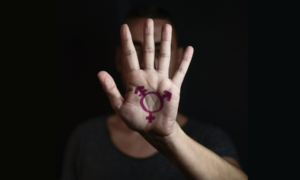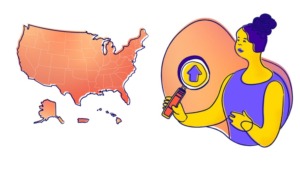By Angela Randolph
Growing up, I always wanted to go to the Caribbean Day Parade on Eastern Parkway in Brooklyn. I live in a neighborhood that is mostly West Indian, and here the parade is taken seriously. My friends used to tell me how so many people came out and represented their countries with floats, colorful costumes, tasty food, and arts and crafts.
I was born in America, and my family has been here as long as I know about. I was afraid I wouldn’t know how to act once I stepped onto Eastern Parkway. But I went to the parade with my friends, who brought flags representing their Caribbean countries. Half of me wanted to carry one of their flags because I wanted to belong. But later, I felt the urge to carry the red, white and blue, which was nowhere to be found that day. I am American, so I thought I should hold up and wave a flag showing my colors and my pride.
But when I approached a vendor and asked if he had the American flag, he gave me a strange look and replied, “Baby, that is the last thing on my mind.”
I didn’t know whether to take the comment as an insult to me or my country, so I just walked away. Later, when I came across the American flag, I bought it.
My friends made their jokes about it here and there. People stared at me as if I was a plague to avoid, and one man told me that I should have bought an African flag instead of buying garbage. When he said that, I felt disrespected.
I admired the parade and recognized the importance of it to Caribbean people. But as I walked home, I thought to myself, “Where do I belong? Is it wrong for a black girl to have pride in America?”
I never really was confused about that before. I know about my ancestors from Africa, slavery, the way they were treated in this country, right up to the present. I know my roots and history.
Even so, I feel America is the country I know about and feel connected to, despite its history and despite the racism that continues today. But sometimes I hear more about racism than I feel it. I think that half the people of my color who complain about the way they are treated by white people have never experienced any harsh treatment from them.
The looks and comments I got at the parade surprised me, because when I see a person of the same race as me, I tend to feel a close connection. Maybe only because they are black, I often think that we have the same values and goals. It never crossed my mind that somewhere down the line there could be a difference.
In truth, my friends may not have been thinking about whether America’s treatment of blacks is acceptable. Some of my friends do not like America for smaller reasons, like they miss their countries and their culture. They only came over here for the better jobs and educational opportunities America has to offer. A part of them still wishes that they were back in their countries.
But I also think people use race and culture to separate themselves from others too often. No one wants to forget her own culture, but sometimes I think it seems too important to my West Indian friends to stick together, and to have no part in being American. If you identify with just one group of people, then you only know one way, but if you are with others, you discover new ways of seeing the world.
It’s easy for me to accept that my friends of other races might have different views from me. Actually, I expect them to, because I know that they come from a different place and did not have the same upbringing. But it wasn’t until I went to the parade that I realized how my upbringing as an American has given me a different perspective from my West Indian friends. It was surprising to me that I would feel like an outcast among black people, who I consider my own.
© New Youth Connections, New York





























